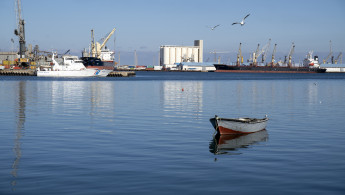Spanish submarine Pisces VI arrives in Lebanon to 'investigate' Tripoli migrant wreck
A submarine arrived at Beirut's port on Wednesday afternoon, the start of a week-long expedition to investigate a shipwreck in Tripoli which contains the corpses of migrants who drowned in April.
The Pisces Vi, a research and scientific exploratory vessel, was transported from Spain to Beirut for the mission. The submarine will be transferred to the northern port city of Tripoli via truck before being assembled and launched into the water on Monday.
The mission aims to investigate and possible extract evidence from a shipwreck off the coast of Tripoli.
On 23 April, a boat carrying around 80 migrants who were trying to reach Cyprus sank after colliding with a Lebanese navy boat. Forty-five people survived and seven bodies were recovered, but the rest of the boat's occupants remain missing.
"The whole point of this project is to bring respect and honour but also hope," Tom Zreika, the co-founder of AUS Relief which chartered the submarine, told The New Arab.
Zreika, who escaped Lebanon on a boat when he was just two years old, has been working to bring the Pisces VI to Lebanon for over three and a half months. His charity has spent $US450,000 to commission the submarine and a crew of six technical experts for seven days.
They are raising money via an online fundraiser to extend the mission if necessary.
The condition of the shipwreck is unclear, so how much the mission can accomplish is uncertain.
But, according to Zreika, step one will be just "getting the submarine into the water." After that, the craft will attempt to reach the sunken ship and then see if evidence or bodies can be extracted from the water.
"We're hoping to bring things up, but because this is still under investigation, anything that we do pull up will be taken by the authorities. Whether that be DNA testing or otherwise," Zreika said.
Lebanese authorities have an open inquiry into the Tripoli disaster, but families and civil society organisations are unhappy with the course of the investigation. The investigation is being conducted through a military court.
Mohamed Sablouh, a lawyer representing the families of the victims of the Tripoli disaster, said that until now, the investigation "has not been taken seriously."
He added that a military court is not the appropriate venue for the investigation as the military should not be the ones investigating their conduct.
Instead, the victims have asked that the issue be transferred to a civil, judicial court. They also sent a letter to the UN Special Rapporteur on Extrajudicial Executions to demand that Lebanese authorities conduct an impartial and transparent investigation.
If Pisces VI can take photographs of the sunken vessel, this could give crucial evidence to the investigation, according to Sablouh.
"Photographing the boat before it is moved will help us know where the damage to the boat came from. Knowing the details of the damage will really help us in the investigation," Sablouh said.
Migration from Lebanon has been increasing steadily since 2019 when the country plunged into what the World Bank has called one of the world’s worst crises since 1850.
The Lebanese army regularly arrests migrants at sea and others have needed to be rescued due to the dangerous conditions of their journeys.





 Follow the Middle East's top stories in English at The New Arab on Google News
Follow the Middle East's top stories in English at The New Arab on Google News


